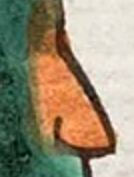yacatl (Mdz42r)
This element for nose (yacatl) has been carved from the compound glyph for the place name Tepeyacac. Here, the nose has been detached from the tepetl) (hill or mountain). The nose is in profile, outlined in black ink, and colored a flesh-tone. The green around it is what remains of the hill that has been carved away.
Stephanie Wood
The phonetic element for yacatl), "yaca," typically appears as an attachment to other glyphic elements in compounds, for example, as an appendage to a ceramic pot or, in the case of this particular one, a mountainside. "Nose" was not literally intended in many place names, but rather it indicated a landscape feature such as a peak, ridge, or a point. In alphabetic textual usage, yacatl often referred to someone or something "in the lead," and in one metaphor or riddle asking what is that "hill" (tepetl) from which there is a flow, the answer was "the nose." This would raise, once again, the association of water (in the form of natural springs) emerging from mountains, which may be the basis for altepetl, the term that referred to a town.
Stephanie Wood
c. 1541, or by 1553 at the latest
Stephanie Wood
Crystal Boulton-Scott made the SVG.
noses

yaca(tl), nose, peak, or the point of something, https://nahuatl.wired-humanities.org/content/yacatl
nose, point, peak, ridge
la nariz, o la punta de algo
Stephanie Wood
Codex Mendoza, folio 42 recto, https://digital.bodleian.ox.ac.uk/objects/2fea788e-2aa2-4f08-b6d9-648c00..., image 94 of 188.
The Bodleian Libraries, University of Oxford, hold the original manuscript, the MS. Arch. Selden. A. 1. This image is published here under the UK Creative Commons, “Attribution-NonCommercial-ShareAlike 3.0 License” (CC-BY-NC-SA 3.0).




